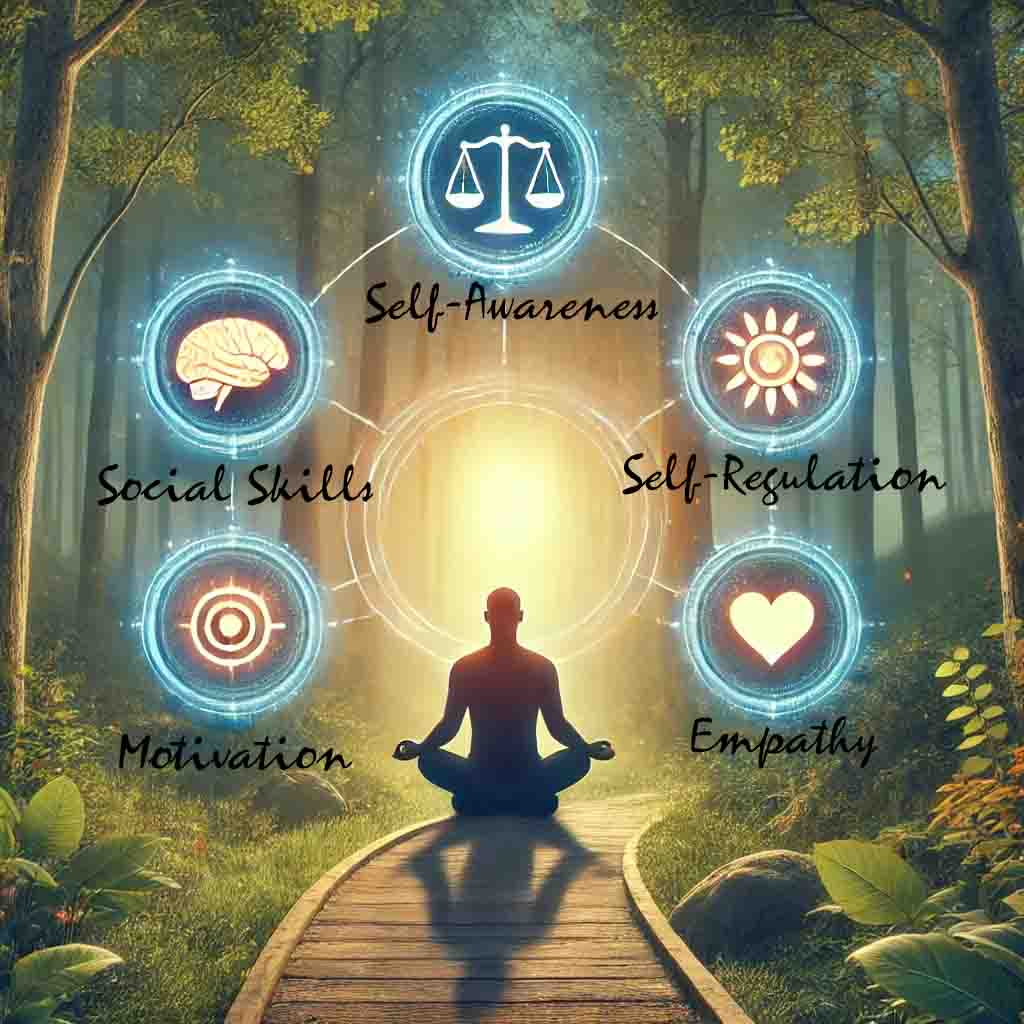5 core components to Master Emotional Intelligence for Inner Peace and Personal Growth
Emotional intelligence plays a crucial role in fostering inner peace by enhancing self-awareness, empathy, and emotional regulation. By understanding and managing our own emotions as well as recognizing the emotions of others, we create healthier relationships and reduce stress, leading to a more harmonious and peaceful state of mind.
Emotional intelligence isn’t just a buzzword; it’s a bridge to finding inner peace and fostering meaningful personal growth. Imagine navigating life’s ups and downs with the same ease you feel walking your favorite nature trail or the calm you experience in a quiet yoga session. This ability to understand and manage your emotions – and those of others – can significantly reshape your emotional landscape.
While it may seem daunting initially, cultivating emotional intelligence involves practical steps grounded in everyday activities such as mindful breathing or reflective thinking. With extensive research and real-life applications backed by experts, our guide aims to offer not just information but actionable strategies for anyone striving for balance and deeper connections in life. To start this journey towards emotional clarity, it’s essential to first grasp what emotional intelligence truly entails.
What is Emotional Intelligence?
Emotional Intelligence (EI) fundamentally refers to our capacity to comprehend and navigate the complex landscape of our emotions and those of others. It goes beyond mere intellectual understanding; Emotional Intelligence informs how we interact with the world around us, influencing our relationships, decision-making, and overall mental well-being.
When we think about Emotional Intelligence in practical terms, we can identify five core components that shape how we relate to ourselves and others.
The Five Components of Emotional Intelligence

Self-awareness
The first component is self-awareness. This involves recognizing your emotional states and understanding how they influence your thoughts and behaviors. For example, imagine a professional who notices when they feel overwhelmed at work. Instead of lashing out at colleagues or becoming paralyzed by stress, this individual takes a moment to breathe, harnesses their emotions, and approaches situations with a clearer mindset.
Self-Regulation
Following closely is self-regulation. This aspect allows individuals to manage their emotional responses effectively. Picture a parent who receives upsetting news but chooses to remain calm while discussing matters with their children. In this instance, self-regulation prevents knee-jerk reactions that could lead to conflict or misunderstandings.
Motivation
Next on the list is motivation—intrinsic motivation fuels the drive to achieve for personal reasons rather than external rewards. High Emotional Intelligence individuals often set meaningful goals that align with their values. For instance, someone passionate about environmental sustainability may pursue a career in renewable energy not just for the paycheck but due to a deeply rooted desire to effect positive change in the world.
Empathy
Another vital component is empathy—the ability to understand and share the feelings of others. Consider an employee who notices a colleague struggling with personal issues; instead of ignoring the signs, they step in with support or offer a listening ear. This empathy fosters stronger bonds and contributes significantly to team dynamics.
Social Skills
Finally, we have social skills which encompass effective communication, conflict resolution, and relationship management. People proficient in these skills can navigate various social contexts with ease. Take for example a leader who promotes open dialogue within their organization; such efforts create an atmosphere where team members feel valued and heard.
Collectively, these components form a robust framework that underpins effective leadership and personal success. A study from TalentSmart reveals that 90% of top performers excel in Emotional Intelligence, highlighting its substantial role in fostering productive interactions and achieving goals both personally and professionally.
Embracing emotional intelligence through these five lenses not only enhances personal development but also lays the groundwork for thriving interpersonal relationships. As we continue exploring this paradigm, it’s essential to understand its relevance in everyday scenarios.
The Importance of Emotional Intelligence in Daily Life

Understanding and improving your Emotional Intelligence can be transformative, giving you the tools to navigate the complexities of social interactions and personal decision-making. In day-to-day scenarios, Emotional Intelligence manifests in various forms, from recognizing when someone needs support to effectively managing stress during challenging situations.
For instance, imagine you’re in a heated meeting where tensions are running high. Your ability to recognize emotional cues—not just from yourself but also from your colleagues—can guide you in addressing conflicts more thoughtfully.
By understanding what underpins these emotions, you can diffuse situations by acknowledging them rather than letting them escalate.
When we weave Emotional Intelligence into our daily practices, it equips us with better skills for resolving conflicts. Think about it: arguments often stem from misunderstandings fueled by emotions.
A person with high Emotional Intelligence can identify these emotional triggers and respond more constructively, paving the way for resolution rather than heightened disputes. Simple strategies like pausing to breathe deeply or taking a moment to clarify your feelings can lead to breakthroughs. This approach doesn’t just help in meetings but carries over into personal relationships as well.
Evidence supports this notion; research indicates that individuals with elevated Emotional Intelligence are significantly less likely to have mental health issues, such as depression – up to 60% less so compared to those with lower Emotional Intelligence. These statistics highlight how crucial emotional awareness is for overall mental health and well-being.
Integrating practices that enhance Emotional Intelligence, such as regular mindfulness – think meditation or reflective journaling – helps cultivate a greater sense of internal harmony. Being in tune with your emotions allows for healthier responses that improve both personal satisfaction and interpersonal relationships.
When you invest time in self-reflection and gain insight into your emotional landscape, it reduces stress levels and enhances clarity in decision-making.
As we explore what it takes to deepen our understanding of ourselves further, we will uncover actionable ways to sharpen our awareness and enhance our emotional skills.
Steps to Develop Self-Awareness
Developing self-awareness is not a one-time event but rather a journey. The act of reflecting on your emotional experiences can help uncover the patterns that govern your reactions. Reflective journaling serves as an excellent starting point for this process, allowing you to explore your thoughts and feelings in a safe space. When you note down daily emotional experiences, you are not just documenting events; you are actively engaging with your actions and emotions. This allows you to identify triggers—moments or situations that provoke strong emotional responses.
For instance, if a sudden criticism tends to make you defensive, write about that incident with as much detail as possible: what was said, how it made you feel, and what thoughts raced through your mind immediately after. By analyzing these occasions, you can begin to understand why certain comments elicit reactions within you. This introspection lays the groundwork for growth and transformation.
Step I – Reflective Journaling
As you start this journaling practice, consider designating time each evening to reflect on your day. Find a quiet corner in your home where distractions are minimal and write freely, allowing your thoughts to flow. You may also create prompts to guide your writing, such as:
- What emotion stood out today?
- What triggered it?
- How did I respond?
By consistently answering these questions, you’ll likely notice recurring themes which can help provide insights into your emotional landscape.
Step II – Practice Mindfulness
Alongside reflective journaling, incorporating mindfulness practices such as meditation or yoga can significantly aid in enhancing your self-awareness. These exercises teach you to be present with your emotions, helping you observe thoughts without immediate judgment or reaction.
Engaging in mindfulness does more than just make you more aware; it also cultivates a non-reactive state of mind, which is crucial for emotional regulation. Using apps like Headspace or Calm can facilitate this journey by guiding you through structured sessions aimed at developing mindfulness skills. With consistent practice, you will become better at recognizing when strong emotions arise and learn to navigate them with greater ease.
Remember that developing self-awareness takes patience and persistence. It’s similar to planting a garden; it requires nurturing over time before you see blossoms of growth and understanding.
This combination of journaling and mindfulness creates a rich tapestry for self-exploration. The insights gained from both methods complement each other beautifully and deepen your understanding of yourself. As you become more attuned to your emotional triggers and responses, you’re setting a solid foundation for the next critical component of emotional intelligence.
With these insights in hand, let’s explore the mechanisms behind controlling our emotions more effectively.
Practicing Emotional Self-Regulation

Emotional self-regulation involves managing your responses to emotional situations, allowing for a calm and constructive way to navigate life’s ups and downs. It’s about using self-awareness to control those impulsive reactions that can lead to regret later. Instead of automatically reacting to stress or frustration, cultivating the ability to pause and reflect before responding can significantly improve your emotional wellness.
Techniques for Self-Regulation
Cognitive Reframing
One highly effective method of emotional self-regulation is cognitive reframing. This technique encourages you to change your perspective about a stressful situation by considering it from different viewpoints. For instance, if you’re feeling frustrated with a colleague who seems uncooperative, take a moment to think: perhaps that colleague is facing their own challenges or pressures that you are unaware of. By shifting your focus onto the potential causes behind their behavior, you’ll often find it easier to respond with empathy rather than irritation. This not only enhances your emotional state but can also foster a more collaborative environment.
Physical Exercise
Let’s not underestimate the power of physical activity in managing emotions. Regular exercise is incredibly effective in reducing stress hormones – like cortisol – and increasing endorphins, the chemicals that boost your mood. Research from Harvard Medical School supports this notion, showing that committing just 30 minutes daily to exercise can lead to significant reductions in stress levels. Whether it’s a brisk walk, intense workout session, or even yoga, incorporating movement into your routine serves as a tool for emotional regulation that promotes overall mental health.
While managing your own emotions lays the foundation, exploring how to truly connect with and understand the feelings of others will further enhance your journey toward personal growth and inner peace.
Cultivating Empathy and Compassion

Empathy allows us to perceive and relate to the emotions of others, while compassion prompts us to act and alleviate suffering. It begins with a simple awareness of those around us. Imagine walking alongside someone who shares their struggles with you; instead of just listening, you can truly feel what they are going through. This deep connection is the cradle of both empathy and compassion.
To start cultivating this essential emotional intelligence skill, it’s important first to engage in active listening. This means setting aside distractions, focusing your full attention on the speaker, and making eye contact to confirm your interest in their narrative. The beauty of active listening lies not merely in hearing words but in noticing body language and emotional cues, creating a fertile ground for empathy to grow.
True compassion emerges when we respond meaningfully to others’ emotions.
Building on empathy, perspective-taking comes into play as a powerful tool. It’s about more than just putting yourself in someone else’s shoes; it’s about seeing the world from their vantage point and understanding their feelings without judgment. When you practice perspective-taking, you allow yourself to visualize situations from others’ experiences. This can prevent misunderstandings and create a respectful dialogue that fosters deeper emotional bonds.
A practical approach to developing these skills is through what I call empathy journaling—a method inspired by experts like Michelle Shahbazyan. By dedicating time each week to write down your observations related to empathy—what you’ve noticed about others’ feelings or reactions—you amplify your awareness of emotional dynamics. Reflecting on these entries can help you identify patterns that inform your responses in future interactions.
| Empathy Exercise | Description |
|---|---|
| Active Listening | Give full attention, make eye contact, and reflect back what you hear. |
| Perspective Taking | Attempt to see situations from others’ viewpoints, really digging into their emotions. |
| Empathy Journaling | Write down empathetic observations and their impact on your understanding of others. |
Once you learn to empathize with others genuinely, you cultivate not only understanding but also a desire to enact compassion. Think back to times when someone showed you kindness during difficult moments – it often sparks a chain reaction that encourages you to reciprocate warmth towards others.
As you develop these qualities, you will begin to notice how they enhance not only your personal satisfaction but also your connections with those around you. This transformation sets the stage for exploring how these skills influence interactions and strengthen the bonds with the significant people in your life.
Strengthening Personal Relationships

At the heart of any strong relationship lies effective communication, a skill that can be significantly enhanced through emotional intelligence (EI). This involves not only expressing your own feelings but also truly engaging with others’ emotions. When you approach conversations with openness and awareness, you’re setting the foundation for genuine connection.
Imagine sitting in a café with a close friend; instead of merely participating in the dialogue, you actively observe their facial expressions and tone of voice. This attentiveness enables you to respond more sincerely, fostering a deeper bond.
Start implementing active listening techniques in your daily interactions with friends, family, or colleagues. Instead of planning your next response while someone is speaking, focus entirely on what they are conveying. This might feel uncomfortable at first, especially if you’re used to bobbing in and out of conversations. However, by fully engaging and validating their feelings — such as saying, “That sounds really tough” — you’re demonstrating empathy and reinforcing trust.
Conflict Resolution
Conflicts are inevitable in relationships, but how you navigate them can either strengthen or weaken your bond. A helpful strategy is to utilize “I” statements when expressing your feelings. This technique redirects the focus from blaming the other person to sharing your perspective, making it easier for them to understand your emotions without feeling attacked.
For instance, rather than saying, “You never listen to me,” which could trigger defensiveness, try framing it as, “I feel unheard when I perceive interruptions during our conversations.” By taking ownership of your feelings rather than projecting blame onto the other person, it invites discussion rather than argument.
Remember that improving personal relationships through emotional intelligence not only gives immediate satisfaction but also lays the groundwork for long-term emotional growth. Nurturing this growth requires patience and practice – embracing each conversation as an opportunity to refine your relational skills.
In every connection you build, celebrate small victories together: acknowledge when an open discussion leads to resolution or when a clearer understanding occurs from using “I” statements. As these techniques become habitual parts of your interactions, profound change will emerge not just in your relationships but within yourself as well – transforming both the quality of conversations and the depth of connections forged through empathy and understanding.
With these principles in mind, exploring specific techniques for fostering emotional growth can enhance both personal connections and individual well-being.
Practical Techniques for Emotional Growth
Emotional growth requires consistent effort and practical strategies. One of the most effective ways to embark on this journey is through mindfulness meditation, which enables individuals to recognize and accept their emotions without judgment. By forming a habit of mindfulness, you learn not only to notice your emotional responses as they arise but also to observe them without immediate reaction or self-criticism. This non-judgmental awareness sets the stage for healthier emotional regulation and understanding.
Mindfulness Meditation
To practice mindfulness meditation effectively, consider starting with guided sessions. Platforms like Insight Timer offer many free resources that can help you ease into the practice. You might find it beneficial to set aside just ten minutes each day initially. Sit in a quiet place, focus on your breath, letting thoughts come and go without engaging with them. Over time, as you regularly return to this practice, you’ll develop a clearer awareness of your emotional landscape, opening pathways for deeper introspection.
Alongside mindfulness meditation, emotional check-ins serve as a practical technique for fostering emotional intelligence.
Emotional Check-Ins
Regularly checking in with yourself creates space for emotional awareness and reflection. Try scheduling simple check-ins throughout your day – perhaps every couple of hours – where you pause and ask yourself, “How am I feeling right now?” Write down your emotions briefly; this physical act reinforces your awareness and provides insights into patterns over time. You may notice certain triggers leading to specific feelings or behaviors, which serves as essential information for personal growth.
These regular check-ins encourage you to become more attuned to your inner world, making it easier to manage your emotional responses.
While these techniques require some investment of time and energy, the long-term benefits they provide are invaluable.
Implementing practices such as mindfulness meditation and emotional check-ins fosters greater self-awareness, enhanced empathy towards others, and improved communication skills – a solid foundation for emotional intelligence development. With each session you meditate or each time you pause to check in with yourself, you’re contributing to a deeper understanding of who you are emotionally, paving the way toward lasting personal growth and inner peace.
As we explore further, let’s examine how these foundational practices create enduring advantages in your emotional journey.
Long-term Benefits of High Emotional Intelligence

One of the most notable advantages of cultivating high emotional intelligence is the profound improvement in mental health. Individuals with high emotional intelligence often report fewer instances of anxiety and depression. This improvement stems from managing emotions as well as self-awareness to recognize triggers and navigate them effectively.
When you understand your emotional landscape, you’re less likely to be overwhelmed by stressors because you can anticipate and defuse them before they escalate.
Studies indicate that people with high emotional intelligence often experience a 50% reduction in stress levels compared to their peers. This internal balance significantly contributes to overall mental health stability.
As we explore deeper, it’s important to note that these emotional skills also facilitate stronger relationships.
Another critical area positively impacted by high EI is interpersonal relationships. Individuals who master the art of empathy can build connections grounded in understanding and compassion. This deepens trust and mutual respect, opening pathways for conflict resolution.
Relationships bloom when both parties feel heard and validated—a foundation built on emotional rapport. Furthermore, strong relationships lead to better physical health as well. Research shows that supportive social interactions can enhance one’s immune system, meaning investing time in nurturing connections can pay dividends in longevity and well-being.
Remarkably, data indicates people with higher emotional intelligence enjoy 30% better relationships both personally and professionally—testifying to how crucial these emotional skills are in fostering meaningful connections.
Now let us look at how the professional realm benefits significantly from enhanced emotional intelligence.
On the career front, individuals equipped with high EI possess essential traits such as adaptability, leadership, and teamwork—all highly valued in today’s workplace. Studies reveal that those with robust emotional intelligence are 75% more likely to receive promotions and have overall better career prospects than their counterparts with lower EI levels. This reflects the ability to work not just harder but smarter through collaboration and understanding within teams.
In holistic circles, like those fostered at Andean Trail Kitchen, members have expressed how integrating EI practices into their daily lives leads to enhanced community connections. By prioritizing emotional growth alongside skill development, participants cultivate an environment where everyone thrives—exemplifying how EI translates into communal success.
Recognizing the comprehensive benefits of high emotional intelligence reinforces its significance as a focal point in your personal growth journey. Aligning Emotional Intelligence practices with broader holistic initiatives paves a path toward lasting inner peace and well-being. Embracing these qualities can set you on a course for achieving your goals while enriching the lives of those around you.
Conclusion
The path to emotional intelligence is not a destination but a lifelong journey of growth and self-discovery. As we’ve explored throughout this guide, the benefits of developing your Emotional Intelligence extend far beyond personal satisfaction – they touch every aspect of your life, from the quality of your relationships to your professional success and, most importantly, your inner peace.
Remember that every small step you take toward understanding your emotions better, whether through mindful meditation, reflective journaling, or regular emotional check-ins, creates ripples of positive change. These ripples gradually transform into waves of improved self-awareness, stronger relationships, and enhanced resilience in facing life’s challenges.
The research is clear: those who invest in their emotional intelligence experience reduced stress, more fulfilling relationships, and greater career success. But perhaps the most profound reward is the deep sense of inner harmony that comes from truly understanding yourself and connecting authentically with others.
As you begin or continue your journey toward emotional mastery, be patient with yourself. Like any worthwhile endeavor, developing emotional intelligence takes time and practice. Each moment of self-reflection, each mindful breath, and each empathetic interaction builds upon the last, gradually sculpting you into a more emotionally aware and balanced individual.
The question isn’t whether to develop your emotional intelligence – it’s how to begin right now. Start with one small practice today, whether it’s taking five minutes for mindful breathing or writing in your journal. Your future self will thank you for taking these first steps toward a more emotionally intelligent and fulfilling life.
If you’re ready to delve into one of the 4 other aspects that will literally change your life, take a look at 5 Aspects of Holistic Health for Beginners: 2025 Complete Guide
Remember, in a world that often prioritizes external achievements, your investment in emotional intelligence is an investment in lasting inner peace and genuine connection – the true foundations of a life well-lived.







